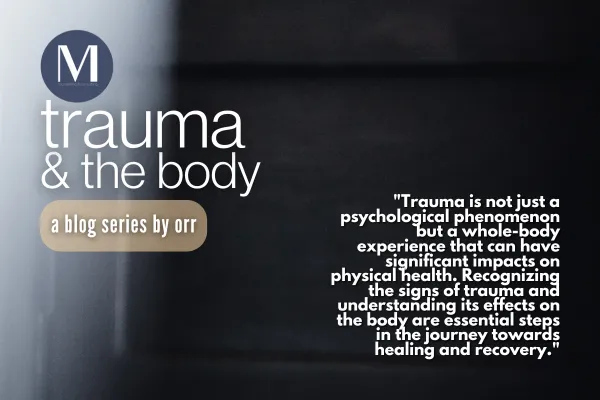the blog
A place for our team to share about topics they are passionate about, in hopes of allowing you to see and understand a bit more behind the faces on these pages.

Understanding Trauma and Its Impact on the Body
Hi, it’s us again, here to talk about trauma. For those who may not be familiar with the term or its meaning, let’s do a quick recap before diving into how trauma affects the body and impacts the nervous system. While we’re not medical doctors and can’t diagnose or label health conditions, we think it’s helpful to explore how trauma and health might be connected. That said, we strongly encourage you to consult with your family doctor for any health-related concerns or questions.
Trauma is a deeply distressing or disturbing experience that can have lasting effects on an individual's mental, emotional, and physical well-being. When we talk about trauma, we are referring to an event or series of events that overwhelm an individual's ability to cope, often leaving them feeling stuck, helpless and vulnerable. Trauma can result from a variety of experiences, including physical or emotional abuse, accidents, natural disasters, or witnessing violence to name a few.
One of the key aspects of trauma is that it doesn't just affect the mind-it has a profound impact on the body as well. The body’s response to stress or danger involves different defensive mechanisms like flight, fight, freeze, or fawn, releasing various hormones such as adrenaline and cortisol. While these responses are crucial for survival in the short term, prolonged exposure to these stress hormones can lead to a range of physical health issues.
For instance, chronic exposure to stress hormones can weaken the immune system, making individuals more susceptible to illnesses. It can also lead to increased inflammation throughout the body, which is a risk factor for a variety of chronic conditions such as heart disease, diabetes, and autoimmune disorders. Additionally, trauma can disrupt the normal functioning of the nervous system, contributing to chronic pain conditions like migraines and fibromyalgia.
Furthermore, trauma often manifests in the form of somatic symptoms, which are physical symptoms that do not have a clear medical cause but are believed to result from emotional distress. Common somatic symptoms include headaches, gastrointestinal issues, and unexplained pain. These symptoms are the body’s way of expressing the unresolved trauma and stress that the brain has not yet processed fully or at all.
So, trauma is not just a psychological phenomenon but a whole-body experience that can have significant impacts on physical health. Recognizing the signs of trauma and understanding its effects on the body are essential steps in the journey towards healing and recovery.
Stay tuned for our next post, where we will explore the relationship between chronic pain and trauma and how conditions like migraines and fibromyalgia can be linked to traumatic experiences.
Office Location: 1200 Brock Street South, Whitby, ON. L1N 4L9
© Marquis Counselling & Consulting | ALL RIGHTS RESERVED | TERMS & CONDITIONS | PRIVACY POLICY
